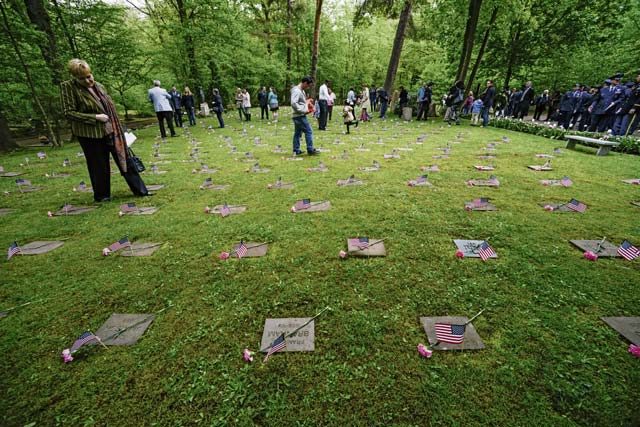
Kaiserslautern Military Community members came together May 14 for the Kindergraves memorial service to honor and remember 451 American children who died during the Cold War and were buried in the Kaiserslautern Military Cemetery.
With a few exceptions, these little ones were the children of American military members stationed in the KMC. At that time, assistance was not available to transport the deceased for a stateside burial.
Most of the children were infants who died of complications before reaching their first birthday.
Chief Master Sgt. Stephen Arbona, Ramstein Area Chief’s Group president, began the ceremony with opening comments.
“We are dedicated in continuing this event each year to remember the children and to honor the sacrifices of their parents,” Arbona said. “The children, born between 1952 and 1971, had no real chance at life. Most died before their first birthday, and we recognize the parents who suffered through the pain and agony of losing their children and had to leave their loved ones behind.”
After the opening comments, Air Force, Army and local community leaders laid wreaths and lit candles to honor the fallen children.
The U.S. Air Force Forces in Europe band then played a song to commemorate the children and parents which was followed by comments by Lt. Gen. Timothy Ray, 3rd Air Force commander.
“It’s an honor and a privilege to be here,” Ray said. “When I think about this setting, I think about a paradox — a paradox of how pretty of a setting this is, and how peaceful of a dynamic we have here, but it’s underscored by an emotional scar. This is about family. When you think about the military, it is all really about family.”
During the initial years, the city of Kaiserslautern donated the use of two public burial plots while local groups associated with the military community maintained these sites.
The lease for the gravesites expired in 1986, but the future of the graves was secured by donations from the German-American Women’s Club of Kaiserslautern, the Army and Air Force Spouse’s Clubs and other private sources.
The RACG volunteered as executive agent and signed the lease with Kaiserslautern. City officials agreed to consolidate the two original gravesites into one area where the children rest today.
The German-American and International Women’s Club and RACG continue to oversee the care and maintenance of the Kindergraves to this day.


